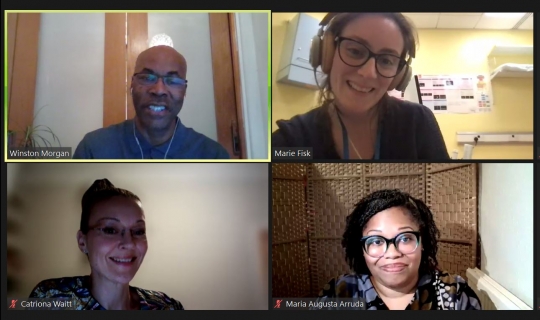News
RSB Policy Lates: Clinical research and tackling health outcome inequalities
- Details
- 27 September 2022
Last week’s latest event in the RSB’s Policy Lates series brought together sector leaders to discuss the challenge of inequalities in clinical research and health outcomes amongst different communities.
The importance of clinical research and trials has recently become more visible to the public due to the emergence of COVID-19 and the development of vaccines in response to the virus.
Although vaccines and therapeutics are intended for use across society, the diversity of trial participants does not always reflect the mix of people seen in the wider population.
The lack of appropriate representation can ultimately lead to differences in real-world health benefits and outcomes arising from the application of clinical trials.
The panellists and speakers, from top left clockwise: Professor Winston Morgan, Dr Marie Fisk, Dr Maria Augusta Arruda, and Professor Catriona Waitt.
The event, chaired by Professor Winston Morgan FRSB, Professor of Toxicology, Equity and Inclusive Practice, University of East London, was held online and delivered with support from the RSB’s Policy Lates Working Group.
Panellist Dr Maria Augusta Arruda, Head of Researcher Development, University of Nottingham, discussed the importance of race and intersectionality of scientists being researched in journals. She noted that groups that are part of ethnic minorities, have a disability and/or identify with the LGBTQ+ community show a disproportionate disadvantage when it comes to the STEM.
Maria made the point that there is a business case to be made, citing a paper that looked at people of colour and women, showing that diversity promotes innovation. Despite this, the research showed that these groups are less likely to earn academic positions.
She emphasised that it is essential to create a blueprint for diversity in high-performance research settings.
Professor of Clinical Pharmacology and Global Health, University of Liverpool, Professor Catriona Waitt, went on to discuss the necessity of planning research to include people with diverse backgrounds.
Touching on research in pregnant women, she commented: “When we think about pregnancy and breast feeding, we talk about the populations that are excluded, but women are not a special or minority population, they make up around half of the world’s population.”
In particular, Catriona stressed: “Everybody deserves access to evidence-based information on which they can make informed decisions about their health. We need to make sure that nobody is excluded from research.”
She went on to talk about the importance of the inclusion of pregnant women in clinical trials, as exposing them to new treatments under closely controlled and monitored conditions means that risks to mother and baby can be mitigated. If they are excluded, some will inevitably be exposed within the wider population, where risks are not controlled to the same extent.
Dr Marie Fisk, Clinical Lecturer at the University of Cambridge, then gave her presentation emphasising the need for research to be translatable to the real-world population with a given condition or disease: “Equity of access needs to be considered throughout the life cycle of clinical research projects, in terms of the delivery and application of results in clinical practice.”
Marie also echoed Catriona’s point, saying: “the study population needs to reflect the real-world population.”
The audience then had a Q&A where the event finished with the panellists discussing the need for the scientific community to draw realistic conclusions from clinical trials and the importance of initiatives such as Athena Swan in promoting diversity.
This event was run with support from the Policy Lates Working Group: the Biochemical Society, the British Pharmacological Society, the Society for Applied Microbiology, the Society for Experimental Biology, and The Physiological Society.
The event will soon be available to watch on the RSB’s YouTube channel.


